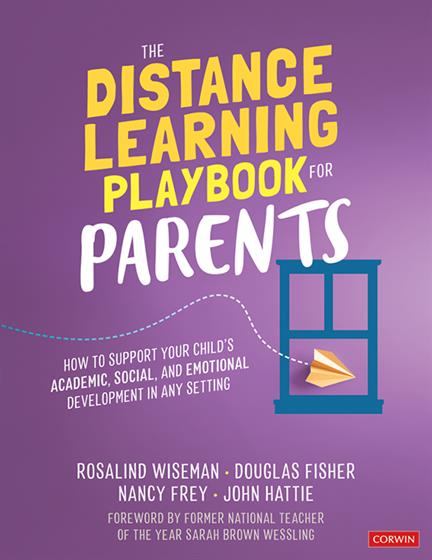
Hands-on, Practical Guidance for Educators
From math,
literacy, equity, multilingual learners, and SEL, to assessment, school counseling,
and education leadership, our books are research-based and authored by experts
on topics most relevant to what educators are facing today.
The Distance Learning Playbook for Parents
Foreword by Former National Teacher of the Year Sarah Brown Wessling
- Grade Level: PreK-12
- ISBN: 9781071838327
- Published By: Corwin
- Year: 2020
- Page Count: 160
- Publication date: September 18, 2020
Price: $22.95
For Instructors
Description
Parent involvement has always been a vital part of any child’s education, but the pandemic and resulting remote instruction require that parents and educators partner at a deeper level.
Following the tremendous success of The Distance Learning Playbook, K-12, education authorities Doug Fisher, Nancy Frey, and John Hattie have teamed up with New York Times bestselling author and parenting expert Rosalind Wiseman to bring you the consummate guide to support your child's academic, social, and emotional development in any learning environment – while not overwhelming you in the process.
This essential guide will arm you with the tools and insight to
- Create an environment conducive to learning, establish routines, and most importantly, take care of yourself and your child
- Maximize the time you spend supporting learning by focusing on what is proven to work best in education
- Help your child develop the cognitive attitudes and habits that foster creativity, critical thinking, and increased responsibility for their learning
- Support the development of your child’s social and emotional learning skills, including the ability to navigate social interactions, build friendships, and regulate emotions at a time when they have never been more important to have, and more challenging to maintain
A Spanish translation of the Distance Learning Playbook for Parents, Aprendizaje a Distancia en Casa, Guia para Padres, can be purchased by contacting Irene Yepez at vigaexporta@trillas.mx or online at etrillas.mx.
Author(s)

Rosalind Wiseman

Douglas Fisher
Douglas Fisher is professor and chair of educational leadership at San Diego State University and a leader at Health Sciences High and Middle College. Previously, Doug was an early intervention teacher and elementary school educator. He is a credentialed teacher and leader in California. In 2022, he was inducted into the Reading Hall of Fame by the Literacy Research Association. He has published widely on literacy, quality instruction, and assessment, as well as books such as Welcome to Teaching, PLC+, Teaching Students to Drive their Learning, and Student Assessment: Better Evidence, Better Decisions, Better Learning.

Nancy Frey
Nancy Frey is professor of educational leadership at San Diego State University and a leader at Health Sciences High and Middle College. Previously, Nancy was a teacher, academic coach, and central office resource coordinator in Florida. She is a credentialed special educator, reading specialist, and administrator in California. She is a member of the International Literacy Association’s Literacy Research Panel. She has published widely on literacy, quality instruction, and assessment, as well as books such as The Artificial Intelligences Playbook, How Scaffolding Works, How Teams Work, and The Vocabulary Playbook.

John Hattie
Table of Contents
Foreword
Letter From the Authors
Acknowledgments
How to Use This Book
Hold Up! Please Read This!
Distance, Remote, and Blended Learning
1. THE BASICS
Establish Routines
Create a Learning Environment
Learn the Learning Management System
Follow Zoom Etiquette
Ensure That Your Children Sleep
Monitor Screen Time
Communicate With Teachers
Take Care of Yourself
2. THE VALUE OF . . .
The Value of Reading Volume
The Value of Reading Widely
The Value of Reading Aloud
The Value of Vocabulary Games
The Value of Oral Language Development
The Value of Foundational Reading Skills: Phonemic Awareness
The Value of Foundational Reading Skills: Alphabetics and Phonics
The Value of Foundational Reading Skills: Fluency
The Value of Writing Across the Day
The Value of Scaffolded Writing Experiences
The Value of Mathematics Across the Day
The Value of Supplemental Mathematics Instruction
The Value of Arts and Music
The Value of Guiding, Not Telling
The Value of Wait Time
The Value of Practice
3. THE PRINCIPLES OF WELL-BEING
Social Emotional Learning Is Not Just Soft Skills
Happiness
The Power of Dignity
Separating Dignity From Respect
Putting Principles Into Action
Understanding Emotional Regulation
Emotional Granularity
Anxiety
Self-Compassion
Managing Conflicts
Friendships in COVID-19
Teasing: It’s Complicated
Bullying
Communication With Other Parents
Pod Teaching: Learning Pods
4. THE MINDFRAMES
MINDFRAMES FOR STUDENTS
Student Mindframe 1: Know your current level of understanding.
Student Mindframe 2: Know where you are going and have the confidence to take on the challenge.
Student Mindframe 3: Select tools to guide your learning.
Student Mindframe 4: Seek feedback and recognize that errors are opportunities to learn.
Student Mindframe 5: Monitor your progress and adjust your learning.
Student Mindframe 6: Recognize your learning and teach others.
THE 10 MINDFRAMES FOR FAMILIES
Family Mindframe 1: I am an evaluator of my impact on my children’s learning.
Family Mindframe 2: I see the power of collaborating with others in parenting our children.
Family Mindframe 3: I value what my child brings to the family and world.
Family Mindframe 4: I understand the centrality of my child.
Family Mindframe 5: I have appropriately high expectations.
Family Mindframe 6: I listen, build trust, and know how to gradually release responsibility.
Family Mindframe 7: I know the balancing act between developing autonomy, relatedness, and competence.
Family Mindframe 8: I appreciate the power of feedback and the place for praise as well as errors.
Family Mindframe 9: I know how to work with the school.
Family Mindframe 10: I am a parent, not a schoolteacher.
References
Index
About the Authors
Reviews
"If you want to be a Jedi master of distance learning, read this book! It’s a guide for mental strength, practical know-how, and social-emotional support. This is the only pandemic parenting book you’ll need, and I’m telling all my parent friends about it."
Rachel Simmons, author and Good Morning America parenting expert"If you want to be a Jedi master of distance learning, read this book! It’s a guide for mental strength, practical know-how, and social-emotional support. This is the only pandemic parenting book you’ll need, and I’m telling all my parent friends about it."
"The Distance Learning Playbook for Parents is brilliant and timely. The tips in the book are fabulous—what every parent needs. Every educator should be recommending that parents get it."
Dr. Michele Borba, Parenting expert and author of "UnSelfie: Why Empathetic Kids Succeed in Our All-About-Me World""The Distance Learning Playbook for Parents is brilliant and timely. The tips in the book are fabulous—what every parent needs. Every educator should be recommending that parents get it."
"The Distance Learning Playbook for Parents isn’t just for parents. It’s for older siblings and all caregivers, too. Even teachers can gain knowledge from this book! It leads you down a path of understanding from the perspective of children and teachers, and advises parents to be compassionate during this strange time of distance learning. Every parent across America should buy this book—it can help you make a step- by-step plan for your own household while your student is learning virtually."
Taylor Pittman, 17-year old student and big sister to a 6-year old brother"The Distance Learning Playbook for Parents isn’t just for parents. It’s for older siblings and all caregivers, too. Even teachers can gain knowledge from this book! It leads you down a path of understanding from the perspective of children and teachers, and advises parents to be compassionate during this strange time of distance learning. Every parent across America should buy this book—it can help you make a step- by-step plan for your own household while your student is learning virtually."
New Orleans, LA
“The Distance Learning Playbook for Parents is an amazing book. As a parent of a 4-year-old and a 9-year-old, I now feel equipped to handle the challenges that distance learning presents. This book gives me the tools to develop routines and strategies I can use to help my children in their distance learning process. I was feeling lost and stressed out about how I was going to handle the school year. Now I feel empowered, and I understand how I'm going to tackle the upcoming year.”
Farrah Lin“The Distance Learning Playbook for Parents is an amazing book. As a parent of a 4-year-old and a 9-year-old, I now feel equipped to handle the challenges that distance learning presents. This book gives me the tools to develop routines and strategies I can use to help my children in their distance learning process. I was feeling lost and stressed out about how I was going to handle the school year. Now I feel empowered, and I understand how I'm going to tackle the upcoming year.”
Parent
“In a time of uncertainty, parents need to feel encouraged and validated. This resource does exactly that. Families need to understand that distance learning is not going to damage our children’s education. Our children will succeed as long as parents, teachers, and students communicate and work together. We are not in this alone. We must remember to take care of ourselves so that we can be supportive and helpful to our children.”
Sylvia Porras“In a time of uncertainty, parents need to feel encouraged and validated. This resource does exactly that. Families need to understand that distance learning is not going to damage our children’s education. Our children will succeed as long as parents, teachers, and students communicate and work together. We are not in this alone. We must remember to take care of ourselves so that we can be supportive and helpful to our children.”
Parent
For Instructors
Related Resources
- Access to companion resources is available with the purchase of this book.

